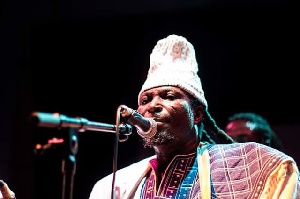 Ghanaian musician, King Ayisoba
Ghanaian musician, King Ayisoba
Music in Ghana would not have been complete without the efforts of the man who has impacted lives through his traditional music that has made him prominent in the country.
He is a source of inspiration to many, especially those from his hometown in the Northern Region. He incorporates the Northern culture into his music endeavours, both locally and internationally, through the use of the smock attire.
King Ayisoba was born in 1974 in Bongo Soe, Bongo area, near Bolgatanga in the Upper East Region. He grew up in a small village and as a boy, he always had his kologo with him whenever he took the family sheep and cattle out to graze.
He played at markets, local bars and funerals until he was old enough to leave the region and try his songs on the people in big cities like Kumasi and Accra. A useful musical collaboration started between him and the late Terry Bonchaka, a hip-hop artiste from Accra.
Bonchaka’s early death was a big setback to King Ayisoba but linking up with recording engineer and music producer Panji Anoff turned his fortunes around. The work of the two resulted in the first cassette and CD in 2006 called “Modern Ghanaians”. It contains songs with the flavour and spice of modern hip-hop mixed with Ayisoba’s traditional style.
The single “I Want to See You My Father” became a huge hit and in 2007 Ayisoba was crowned the king in the Ghana Music Awards Festival held at the national theatre as part of Ghana’s 50th anniversary celebrations. In 2008 “Africa”, His second album was released on Pidgen Music.
Again a mix of electronic beat-driven tracks and traditional style songs like the hit “The Whole World”. In 2005 Ayisoba was invited for a project in Chicago, USA and since 2009 King has been a regular artist in Europe. He was invited by the Sababas project from Denmark and played on the Womex festival caravan. In the following years, he returned to Denmark and also played in Germany and Switzerland.
In 2012, Ayisoba joined Dutch artiste Zea on a tour through the Netherlands, Belgium, France, Switzerland and Germany and at the end of that tour the plan was made to release an LP with his best songs, called “Modern Ghanaians”.
In December 2012 King Ayisoba was nominated in the category of the best traditional song at the Okura African Music Awards in Abidjan, Cote d’Ivoire. In March 2013, he made his entrance in Russia and in May 2013 later returned to Europe with his own band from Ghana to promote the release of the LP on Zea’s own Makkum Records (MR 8) and to let as many people as possible hear the kologo music from Northern Ghana.
In March 2014, Ayisoba returned with a full band of musicians and dancers and toured together with Zea all over Europe including the UK. In June 2014 the full band returned for the summer festivals including Roskilde Festival in Denmark and the Fusion Festival in Germany. Just before that tour his new album called “Wicked Leaders” was released on Makkum Records (MR 11).
In October 2014, Ayisoba did a full tour all over the UK and played at the London Africa Festival. In March 2015 the Wicked Leaders album was released in France by Mansa Live Productions and followed by a three-week tour. Ayisoba won for the second time in his career the Ghana Music Award for best traditional song for the song “Mbhee” from the Wicked Leaders album and also secured the Traditional Song of The Year category.
In March 2016 he came back on tour promoting a new compilation he put together called “This is Kologo Power!”, and in the summer more festivals in Europe have seen and heard the hypnotic kologo grooves.
He has also collaborated with Becca, Shegee and many other artistes since his groundbreaking debut album. Ayisoba sings in Twi, English and Frafra. Some of his song of the songs Obiara eni begye, Fa mi sika mami, Oko agyae mi, My friend, my friend (a tribute to Terry Bon Chaka), Modern Ghanaians and Champion no easy. He is married with 2 children.
In an interview with TV3, he stated that it is right that he works with people going in his direction.
“If you are a musician making music, do you want to move forward or backwards? Who doesn’t like to move forward? So in Ghana, I can say I am different from the usual Ghanaian music. So my music is unique and different. And you can see my dressing and my clothes. So I cannot feature hiplife anyhow. I have to choose the one who is the best,” he said.
King Ayisoba is worth celebrating due to the success he has chalked with his traditional music style which has gained recognition globally.
SB/OGB